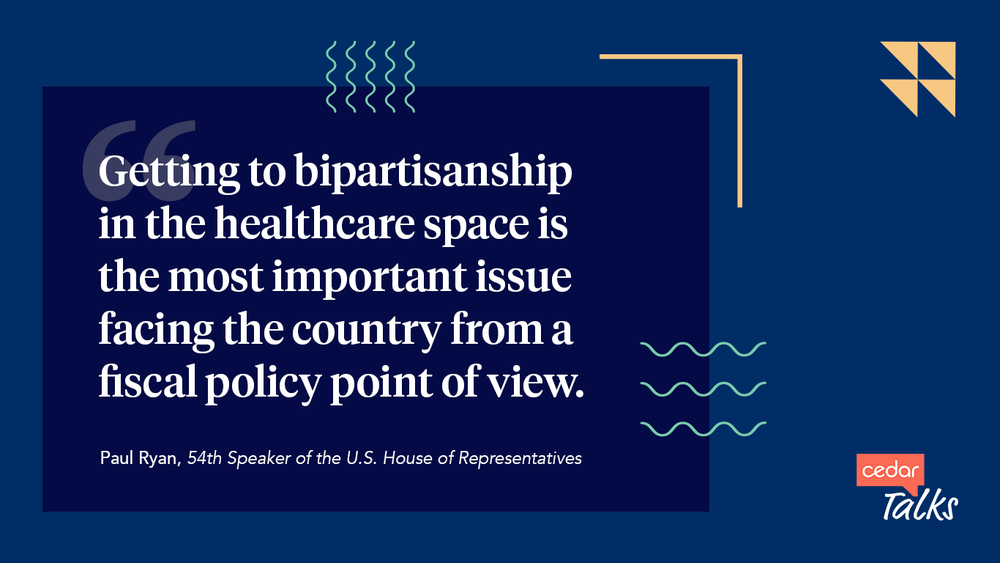A long-time advocate of healthcare reform, former Speaker of the U.S. House of Representatives Paul Ryan championed healthcare reforms aimed at reducing costs and improving consumer choice for 20 years and served as chairman of both the House Ways and Means Committee and the House Budget Committee. He is currently a professor of the practice at the University of Notre Dame and a visiting fellow in the practice of public policy at the American Enterprise Institute.
In a recent Cedar Talk, he shared insights into healthcare politics, the future of post-COVID-19 health policy and more.
To watch the full interview, click here. Discussion highlights follow.
The two main reasons for congressional dysfunction
Paul Ryan initially aspired to go into economics, teaching at the University of Chicago, but got “pulled into politics” by former mentor Jack Kemp—after which he quickly found himself “addicted to public service as a vocation.”
After joining congress just five years out of college, he served for 20 years, and observed major changes to the legislative approach during his time in the House. When asked to elaborate on how Congress has changed since he was first elected, he quickly offered up a rhetorical, “how much time do you have?”
According to Ryan, the most consequential changes can be boiled down to two shifts, one procedural and one political. The former is what’s become an over-centralized budgetary process where legislation is, “written by effectively four people and their staff.” The second trend was a new breed of politicians chronically playing to their base in the media—social and otherwise.
“10 years ago if you wanted to succeed in politics, you had to scale a meritocracy,” he said. “The measuring stick […] was persuasion and policy […] In this day and age, you can leapfrog that entire meritocracy. You don’t have to put in the time to really learn an issue because there’s a new wing of both political parties that I call the ‘entertainment wings.’”
What defines the “entertainment wings,” and why does Ryan believe they’re incapable of getting consensus? Find out at 5:14.
How can we get to bipartisanship?
In Ryan’s view, achieving bipartisanship in healthcare politics is, “the most important issue facing the country from a fiscal policy point of view, because it is the source of our coming debt crisis.”
According to his analysis, there’s room for bipartisanship once we “get the ideological and polarizing edges sanded off” our discourse.
“[Republicans] need to concede you want universal coverage, you want guaranteed issue and there’s some kind of component of community rating that must occur so that everybody can get affordable care. [Democrats] have to accept that there’s going to be private providers—free enterprise will exist in this ecosystem.”
Click here and navigate to 9:12 to learn what “putting down our ideological swords” looks like and why Ryan believes Cedar’s mission is central to an “ecosystem of competition.”
How will public-private partnerships spur healthcare innovation?
When asked about public-private partnerships (25:56), Ryan expressed optimism that both sectors could contribute and collaborate toward a “marriage of convenience.”
“The private sector has got to take the lead on innovation in healthcare to bring down costs to improve technology, to flatten the inflation rates and help save us from a debt crisis,” he pointed out, but added that policymakers needed to ensure the viability of healthcare technology business models.
“Hopefully policy makers can clear the way regulatory wise [and] policy wise so that technology […] can bring that price compression—that type of competition to healthcare. Because if we can get prices down through choice, competition and innovation that can do so much to save this country from a lot of problems.”
Want to find out what Ryan calls the root cause of health inflation? How we can unlock the power of consumer choice? And the one policy change he could make if he could “snap his fingers” and make it happen? Check out the full discussion.
Cedar Talks is a thought leadership series focused on highlighting experienced entrepreneurs, tech innovators and healthcare leaders who are solving important problems by challenging the status quo. Recent Cedar Talks have included Clinton Foundation Vice Chair Chelsea Clinton, Peloton co-founder Graham Stanton, former President of Livongo Dr. Jennifer Schneider and venture capitalists Marc Andreessen and Scott Kupor of Andreessen Horowitz. If you’d like to be notified of future Cedar Talks, click here to join the mailing list.



